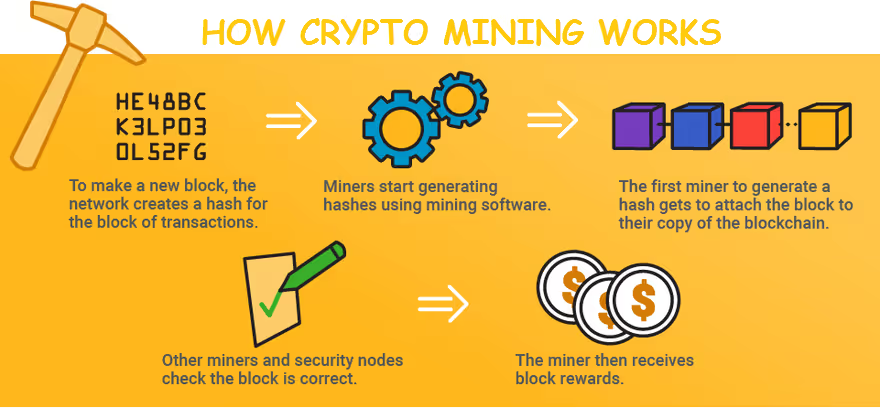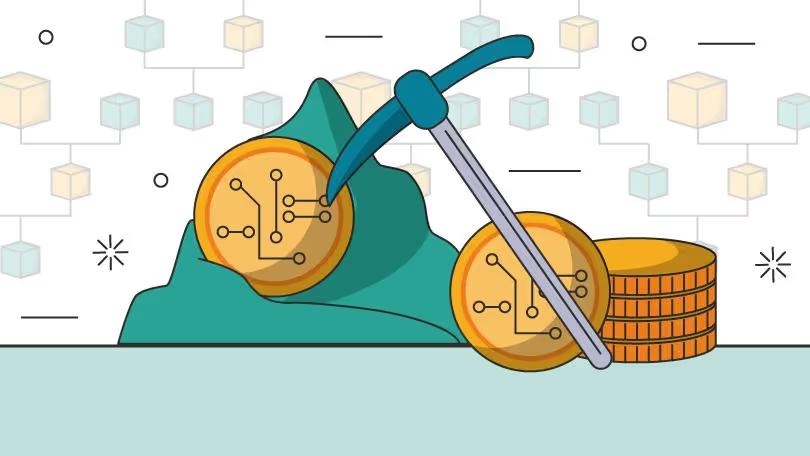.avif)
Calculate Your Crypto
Taxes in Minutes
.avif)
In the cryptocurrency industry, the term "mining" holds a central place. But what exactly is crypto mining and how does it work?
If you are wondering the same, in this guide, we discuss everything you need to know about mining cryptocurrency to earn rewards and also share the potential tax liability that you can incur in the process.
What Is Crypto Mining?
Cryptocurrency mining, or simply 'Crypto mining', is the process of verifying and adding cryptocurrency transactions to a blockchain ledger.

Every time a cryptocurrency transaction is made, a cryptocurrency miner is responsible for ensuring the authenticity of the information and updating the blockchain with the transaction. It is a crucial component of the cryptocurrency ecosystem, providing both security and continuity.
Common Crypto Mining Terms
Crypto mining involves unique terminology. Here are some common terms you should know:
Miners
These are the individuals or organizations participating in the mining process to earn cryptocurrency rewards.
They use computational power to solve complex mathematical problems to validate transactions and add them to the blockchain.
Transactions
This is the action of transferring digital currencies from one account to another, with each transaction recorded on the blockchain.
Every transaction contains information about the sender's and recipient's addresses, the amount of cryptocurrency transferred, and the time of the transaction.
Blocks
Blocks are like digital files that store information about completed transactions in a blockchain.
Each block contains a list of transactions, the timestamp of when the block was created, the hash of the block itself, and the hash of the previous block. The latter connect each block to its predecessor, forming a chain of blocks or a 'blockchain'.
Hashes
These are the outputs of the hash algorithm, which takes an input and returns a fixed-size string of bytes. The output is unique to each unique input.
Miners take the transaction data and run it through a hash function to produce a hash. Finding a hash that meets certain conditions is the primary task in mining a new block.
Nonces
A nonce, or 'number used once', is a random value that is part of the block data. Miners change the nonce to generate a different hash value for the new block.
Once a nonce is used, it cannot be used again. This enhances the security and uniqueness of each block in the blockchain.
Blockchain
It is a decentralized and distributed ledger that records all transactions across a network of computers. The data on the blockchain is stored in blocks that are linked to each other in a way that forms a chain.
This ensures the integrity and transparency of all transactions, as altering information in one block would require changes in all subsequent blocks.
Nodes
These refer to the fundamental units of the blockchain infrastructure that maintain the blockchain by storing data and upholding network rules.
They are essentially computers or servers that participate in the blockchain network. Each node has a copy of the entire blockchain and is responsible for verifying and relaying transactions to other nodes.
Consensus Algorithm
These mechanisms ensure all nodes, or participants, in a blockchain network agree on the content of the blockchain.
They are vital in maintaining the integrity and security of the blockchain. Examples of consensus algorithms include Proof of Work (PoW) and Proof of Stake (PoS).
How does crypto mining work?
The process of crypto mining involves competing with other crypto miners to solve complicated mathematical problems using cryptographic hash functions that are associated with a block containing the transaction data.
The first crypto miner to crack the code is rewarded with the ability to authorize the transaction and earn small amounts of cryptocurrency.

The Process of Crypto Mining Explained
The mining process begins with miners trying to solve a mathematical problem. This problem is derived from the data in the most recent block of transactions they're working on. Because the problem is so complex, it can only be solved through a method of trial and error, where the miner's computers are guessing numbers rapidly.
What makes these problems complex is the use of cryptographic hash functions. The miners need to find a specific hash value – one that is below a certain target value set by the system.
When a miner's system finds a hash value that's below the target, they've solved the problem. Their solution is shared with the other miners in the network, who can easily verify it.
Once verified, the transactions in the block are considered confirmed, and the block is added to the blockchain.
The winning miner (or miners, if they're part of a mining pool) receives a certain amount of cryptocurrency as a reward. This reward is two-fold: it includes the mining reward for solving the block, which is a set amount of the cryptocurrency that's "minted" as part of the process, and any transaction fees for the transactions included in the block.
After this, miners repeat the process with the next block of transactions. Through this, cryptocurrency miners keep the blockchain secure, up-to-date, and unalterable by repeatedly verifying and collecting new transactions into the block.
How is crypto mining taxed?
The crypto taxation rules can vary depending on your location, mining scale, and earnings. In most regions, both income tax and capital gains tax apply to mining activities.
Cryptocurrency mining rewards are typically treated as taxable income, which equals the token's market value at the time of receipt.
If you sell these crypto rewards and earn a profit, you may be subject to capital gains tax. This is calculated using the difference between the selling price of your digital asset and your cost basis.
For those engaged in mining as a business, eligible expenses such as equipment costs, electricity expenses, and equipment repairs may be deductible.

To simplify your taxes, Kryptos offers a categorization option for your crypto mining transactions.
Simply mark your mining rewards as 'mining'. The platform will automatically apply the relevant tax rules to each transaction and update your tax liabilities.
If you decide to sell these rewards, Kryptos's algorithm will recognize and apply the appropriate tax rules to those transactions as well, ensuring accurate tax calculations for your mining activities.
Want to calculate your mining taxes? Sign Up for free now.
FAQs
1. Is crypto mining illegal?
The legality of crypto mining varies from country to country. It’s legal in most jurisdictions including the US. However, bitcoin mining is banned in multiple countries such as China, Bangladesh, Iraq, Qatar, Morocco, and more. Research your local regulations before getting involved in crypto mining.
2. Can you make money from crypto mining?
Yes, it is possible to make money through cryptocurrency mining. But the profitability of mining depends on several factors, including the cost of electricity in your location, the efficiency of your mining hardware, the current market price of the cryptocurrency you're mining, and the network’s mining difficulty.
3. How can I start crypto mining?
To start mining, you'll first need to decide which cryptocurrency you want to mine. Some coins, like Bitcoin, require specialized hardware known as ASIC (Application-Specific Integrated Circuit) devices. Others, like Ethereum, can be mined using powerful GPUs.
After setting up your hardware, you'll need to download and install mining software that corresponds with the hardware you're using. You can also join a mining pool, where you combine your computing power with other miners to increase your chances of earning rewards.
4. How to mine Bitcoin in India?
The process of mining Bitcoin in India is the same as anywhere else. You'll need to acquire the right hardware (typically ASIC devices for Bitcoin), choose a Bitcoin wallet to store your earnings, join a mining pool, and run the right mining software on your device.
5. Can I mine crypto on my phone?
While technically possible, mining crypto on a smartphone is not practical. The computational power of a smartphone is vastly inferior to specialized mining hardware or even a good desktop CPU or GPU. Moreover, the strain on the phone's hardware could lead to damage, and the electricity costs would far outweigh the potential profits.
6. Can I mine Bitcoin on my laptop?
While you can mine Bitcoin on a laptop, it is generally not recommended. Like smartphones, laptops lack the computational power needed to mine Bitcoin effectively. Mining puts a heavy load on the device which can lead to overheating and hardware damage. The potential reward you would get from mining Bitcoin would likely be far less than the cost to repair or replace the laptop.
All content on Kryptos serves general informational purposes only. It's not intended to replace any professional advice from licensed accountants, attorneys, or certified financial and tax professionals. The information is completed to the best of our knowledge and we at Kryptos do not claim either correctness or accuracy of the same. Before taking any tax position / stance, you should always consider seeking independent legal, financial, taxation or other advice from the professionals. Kryptos is not liable for any loss caused from the use of, or by placing reliance on, the information on this website. Kryptos disclaims any responsibility for the accuracy or adequacy of any positions taken by you in your tax returns. Thank you for being part of our community, and we're excited to continue guiding you on your crypto journey!
| Step | Form | Purpose | Action |
|---|---|---|---|
| 1 | 1099-DA | Reports digital asset sales or exchanges | Use to fill out Form 8949. |
| 2 | Form 1099-MISC | Reports miscellaneous crypto income | Use to fill out Schedule 1 or C. |
| 3 | Form 8949 | Details individual transactions | List each transaction here. |
| 4 | Schedule D | Summarizes capital gains/losses | Transfer totals from Form 8949. |
| 5 | Schedule 1 | Reports miscellaneous income | Include miscellaneous income (if not self-employment). |
| 6 | Schedule C | Reports self-employment income | Include self-employment income and expenses. |
| 7 | Form W-2 | Reports wages (if paid in Bitcoin) | Include wages in total income. |
| 8 | Form 1040 | Primary tax return | Summarize all income, deductions, and tax owed. |
| Date | Event/Requirement |
|---|---|
| January 1, 2025 | Brokers begin tracking and reporting digital asset transactions. |
| February 2026 | Brokers issue Form 1099-DA for the 2025 tax year to taxpayers. |
| April 15, 2026 | Deadline for taxpayers to file their 2025 tax returns with IRS data. |
| Timeline Event | Description |
|---|---|
| Before January 1, 2025 | Taxpayers must identify wallets and accounts containing digital assets and document unused basis. |
| January 1, 2025 | Snapshot date for confirming remaining digital assets in wallets and accounts. |
| March 2025 | Brokers begin issuing Form 1099-DA, reflecting a wallet-specific basis. |
| Before Filing 2025 Tax Returns | Taxpayers must finalize their Safe Harbor Allocation to ensure compliance and avoid penalties. |
| Feature | Use Case Scenario | Technical Details |
|---|---|---|
| Automated Monitoring of Transactions | Alice uses staking on Ethereum 2.0 and yield farming on Uniswap. Kryptos automates tracking of her staking rewards and LP tokens across platforms. | Integrates with Ethereum and Uniswap APIs for real-time tracking and monitoring of transactions. |
| Comprehensive Data Collection | Bob switches between liquidity pools and staking protocols. Kryptos aggregates all transactions, including historical data. | Pulls and consolidates data from multiple sources and supports historical data imports. |
| Advanced Tax Categorization | Carol earns from staking Polkadot and yield farming on Aave. Kryptos categorizes her rewards as ordinary income and investment income. | Uses jurisdiction-specific rules to categorize rewards and guarantee compliance with local tax regulations. |
| Dynamic FMV Calculation | Dave redeems LP tokens for Ethereum and stablecoins. Kryptos calculates the fair market value (FMV) at redemption and during sales. | Updates FMV based on market data and accurately calculates capital gains for transactions. |
| Handling Complex DeFi Transactions | Eve engages in multi-step DeFi transactions. Kryptos tracks value changes and tax implications throughout these processes. | Manages multi-step transactions, including swaps and staking, for comprehensive tax reporting. |
| Real-Time Alerts and Updates | Frank receives alerts on contemporary tax regulations affecting DeFi. Kryptos keeps him updated on relevant changes in tax laws. | Observe regulatory updates and provide real-time alerts about changes in tax regulations. |
| Seamless Tax Reporting Integration | Grace files taxes using TurboTax. Kryptos integrates with TurboTax to import staking and yield farming data easily. | Direct integration with tax software like TurboTax for smooth data import and multi-jurisdictional reporting. |
| Investor Type | Impact of Crypto Tax Updates 2025 |
|---|---|
| Retail Investors | Standardized crypto reporting regulations make tax filing easier, but increased IRS visibility raises the risk of audits. |
| Traders & HFT Users | To ensure crypto tax compliance, the IRS is increasing its scrutiny and requiring precise cost-basis calculations across several exchanges. |
| Defi & Staking Participants | The regulations for reporting crypto transactions for staking rewards, lending, and governance tokens are unclear, and there is a lack of standardization for decentralized platforms. |
| NFT Creators & Buyers | Confusion over crypto capital gains tax in 2025, including the taxation of NFT flips, royalties, and transactions across several blockchains. |
| Crypto Payments & Businesses | Merchants who take Bitcoin, USDC, and other digital assets must track crypto capital gains for each transaction, which increases crypto tax compliance requirements. |
| Event | Consequences | Penalties |
|---|---|---|
| Reporting Failure | The tax authorities can mark uncontrolled revenues and further investigate. | Penalty fines, interest on unpaid taxes and potential fraud fees if they are deliberately occurring. |
| Misreporting CGT | Misreporting CGT Error reporting profits or losses can trigger the IRS audit. | 20% fine on under -ported zodiac signs, as well as tax and interest. |
| Using decentralized exchanges (DEXs) or mixers without records | The IRS can track anonymous transactions and demand documentation. | Possible tax evasion fee and significant fine. |
| Disregarding Bitcoin mining tax liabilities | Mining reward is considered taxable income, and failure of the report can be regarded as tax fraud. | Further tax obligations, punishment and potential legal steps. |
| Foreign crypto holdings: Non-disclosure | Foreign-accepted crypto FATCA may be subject to reporting rules. | Heavy fines (up to $ 10,000 per fracture) or prosecution for intentional non-transport. |
File Your Crypto Tax in Minutes








